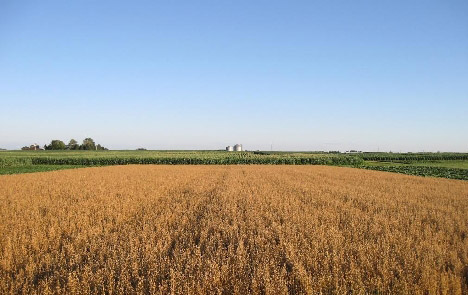The development of modern, industrial agriculture has been characterized by large reductions in biological diversity, both across landscapes and within farming systems. Loss of biodiversity is particularly evident in the U.S. Corn Belt. Simplification of crop and non-crop vegetation in the Corn Belt has resulted in the production of large amounts of crop and livestock products, but has also led to multiple challenges, including soil erosion, water quality degradation, pest resistance to control tactics, new crop diseases, susceptibility to variations in weather and market conditions, and declines in populations of pollinators, natural enemies of crop pests, and wildlife species. Results of two large-scale, long-term field experiments conducted in Iowa addressing the impacts of diversification on agroecosystem performance indicate that (1) conversion of small amounts of cropland to strips of reconstructed prairie provided disproportionately large improvements in soil conservation, nutrient retention, and densities of native plants and birds; and (2) diversification of the dominant corn-soybean cropping system with small grain and forage crops led to substantial reductions in agrichemical and fossil energy use, lower herbicide-related aquatic toxicity, decreased crop damage by certain pathogens, less erosion, and improved soil quality, without compromising profitability. These patterns indicate that increasing biodiversity can be a viable strategy for improving agroecosystem health and resilience in the U.S. Corn Belt.
Matt Liebman is a professor of agronomy and the H.A. Wallace Endowed Chair for Sustainable Agriculture at Iowa State University. He became a fellow of the American Society of Agronomy in 2009 and was a member of the National Academies committee that produced the 2015 report titled “A Framework for Assessing Effects of the Food System.” His research, teaching, and outreach activities focus on ways to improve environmental quality and agricultural productivity while reducing dependence on agrichemicals and fossil fuels. His specific interests include diversified cropping systems, weed ecology and management, and the use of native prairie species for soil, water, and wildlife conservation.
This talk is part of the Diversified Farming Systems Roundtable.


